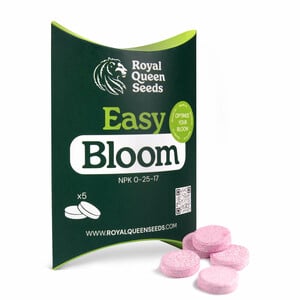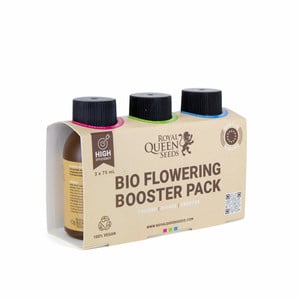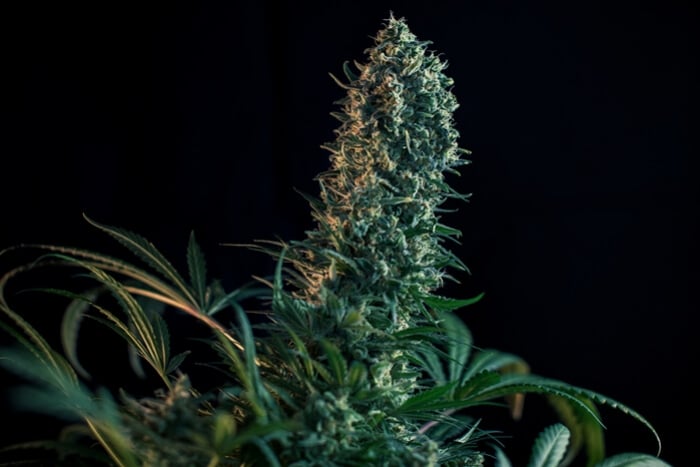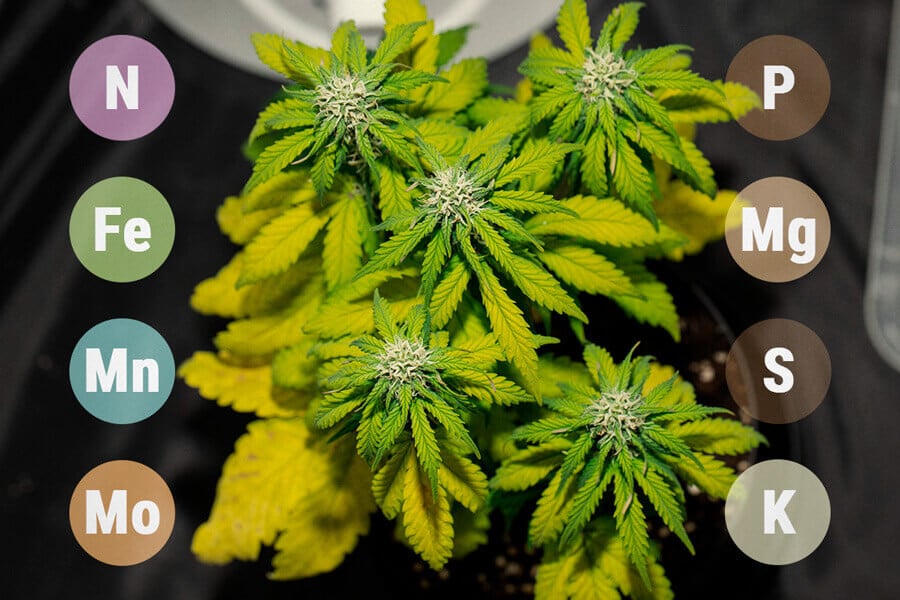.
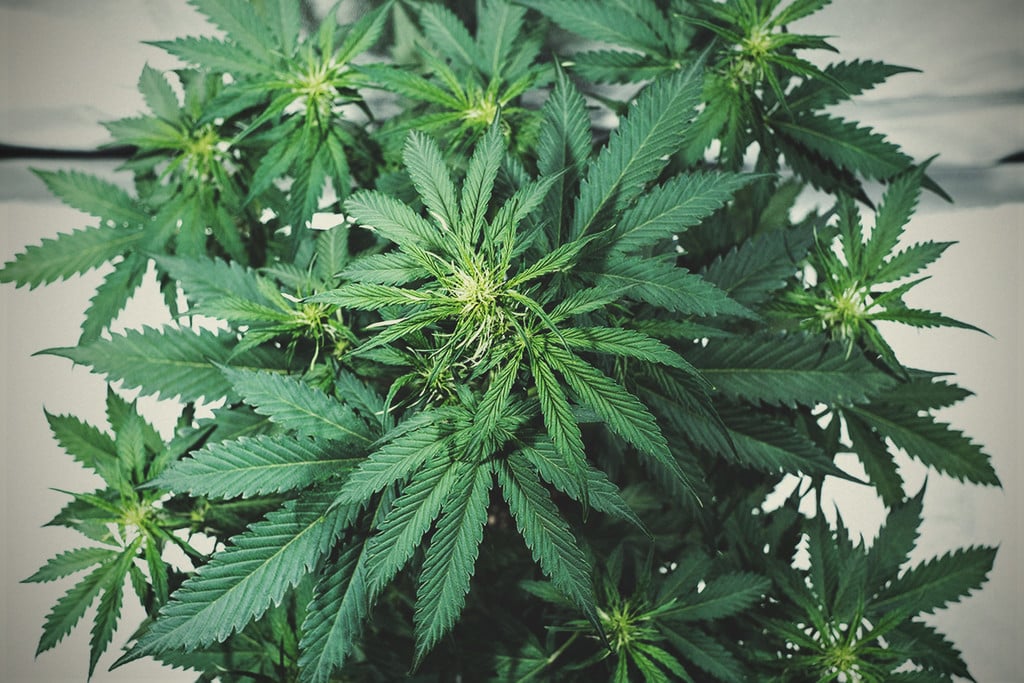
Cannabis Bloom Boosters: Helpful or Hype?
Bloom boosters provide a concentrated dose of all of the nutrients cannabis plants need to produce dense, sticky, and strong buds. These easy-to-use formulas enhance flowering by delivering accurate quantities of key nutrients, humic acid, amino acids, enzymes, vitamins, and growth stimulants. Together, these inputs supercharge the flowering phase.
Contents:
From an outside perspective, growing weed can appear quite difficult. Many other plant species seem to grow just fine with minimal intervention, so why does cannabis require a multitude of bottled potions to ensure it doesn’t collapse into a heap of vegetable matter? Surely all those products that line store shelves are needed, in just the right amount and at the correct times, to keep plants alive and kicking?
Cannabis does get a lot more love and care than, say, carrots and cabbages. And rightly so. As a valuable cash crop with unique phytochemistry, growers invest substantial time and money into ensuring they get the most from their plants.
Naturally, this demand for success has created a thriving market of cultivation products that promise bountiful harvests at the expense of a bottle.
Bloom boosters are one of many formulas that autumn under this umbrella. They’re loaded with nutrients that help cannabis plants form big, bulbous flowers—but they’re not without their controversy. Here we examine the nature of bloom boosters, and whether they’re truly advantageous to the cannabis grower.
The Controversy Around Bloom Boosters for Weed
How could bloom boosters possibly cause any issues? Aren’t they filled with essential nutrients required to bloom resinous buds with a high cannabinoid content? The concerns around bloom boosters are divided into two different categories: salt buildup, and redundancy. Let’s delve into these a bit deeper.
-
Do Bloom Boosters Cause Salt Buildup?
Bloom boosters contain nutrients in the form of salts. We’re not talking about the table salt you generously sprinkle over a portion of chips. In chemistry, salts are compounds caused by the reaction of an acid (a substance that neutralizes the base) with a base (a substance that neutralises acids), and many are water-soluble.
Examples of these compounds include monopotassium phosphate and magnesium sulphate. While suitable levels of these salts provide important nutrients that fulfil key physiological functions (for example, monopotassium phosphate serves as a source of phosphorus and potassium), over-application can lead to salt buildup in the growing medium.
The water-soluble nature of salts means they can “compete” with plants for moisture, and excess levels can cause “burning” of plant tissues. Accumulation of salts can also affect the pH of the growing medium (cannabis prefers only slightly acidic soil) and block the absorption of key nutrients—a state referred to as nutrient lockout.
Given the potential issues caused by high concentrations of these salts, some voices in the cannabis space argue that most formulas are far too heavy in phosphorus and potassium.

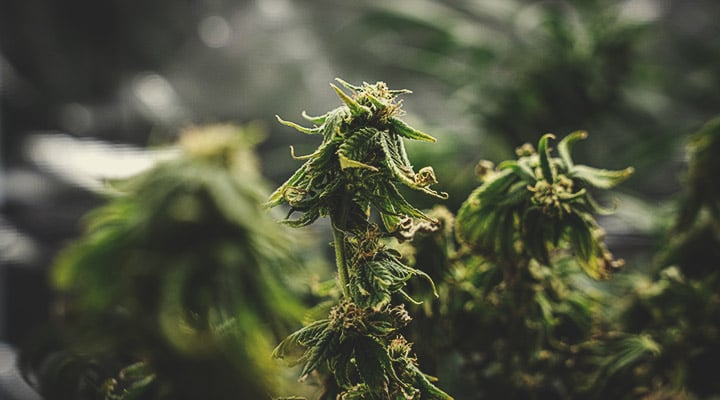
-
Do Cannabis Plants Even Need Bloom Boosters?
Marketing very much revolves around making people think they need a product, even if they don’t. The absurd amount of kitchen appliances out there is a perfect example of this. You don’t need a “pepper prepper” to carve the seeds out of bell peppers or a “taco holder” to fill tacos, but marketeers might just convince you otherwise. Of course, like many of these products, bloom boosters aren’t useless, but they’re simply not needed in certain circumstances.
Should you take a walk in the woods or a stroll through a wildflower meadow, everything should be thriving just fine without the hand of man throwing chemical fertilisers around. That’s because intricate interactions between a vast number of organisms help to keep nutrients cycling efficiently. Everything living eventually dies, and other living creatures make good use of the organic matter left behind.
⇢ Example: Nitrogen
Let’s look at nitrogen (a nutrient needed in smaller quantities during flowering) as an example. All of the nitrogen in dead plant roots and above-ground tissues gets broken down and eaten by bacteria and fungi. Other microorganisms, micro-animals, and worms also play an important role in this process by eating organic matter, or other lifeforms that do.
Nitrogen becomes immobilised in the bodies of these creatures and when they die (or are eaten, and their remains are expelled) this organic nitrogen is mineralized by soil microorganisms. In addition, microorganisms convert the mineralized nitrogen (ammonia) into nitrates; both ammonia and nitrate are plant-available forms of nitrogen.
Healthy living soils filled with diverse microorganisms and other players in the soil food web are capable of cycling nutrients over and over again, ensuring plants can thrive. Growers can help to facilitate this process by keeping roots in the ground post-harvest, mulching, sowing cover crops, and not tilling. When growing cannabis amongst such a bustling community of life, bloom boosters mostly become redundant. However, such systems can take time to establish when working from scratch.
The Role of Cannabis Bloom Boosters
Despite these two primary concerns, the market for bloom boosters continues to blossom, and scores of growers continue to see fantastic results when using these products.
While they have the potential to set a grow back when misused, and might serve little purpose in an established living soil system, bloom boosters contain nutrients that cannabis plants have a high demand for in the flowering stage. They’re especially useful for growers starting from scratch, beginner cultivators, and those who would simply rather apply pre-made cocktails than spend time building reliable soil life.
-
The Contents of Flower Booster Fertilisers
Cannabis plants have an appetite that shifts throughout the growing cycle; vegetative plants have different demands than those deep in the flowering stage. Generally, cannabis has a demand for three nutrients in the highest proportions. These macronutrients—namely, nitrogen (N), phosphorus (P), and potassium (K)—are often displayed on products as an N-P-K ratio, such as 10-5-7.
Healthy cannabis plants contain around 4% nitrogen in their above-ground tissues, and use this molecule for an array of vital processes. Nitrogen contributes a major component to the chlorophyll molecule (the pigment involved in photosynthesis) and also helps to build amino acids—the building blocks of proteins used to create plant structure and enzymes.
Because nitrogen helps plants to establish a strong green colour and fuels leafy growth, cannabis plants require more of this macronutrient during the vegetative stage of the growing cycle. Indeed, they still require it during flowering, but less of it. After all, flowering weed plants are still producing leafy structures such as sugar leaves and bracts (specialised leaves that surround the lower portion of the hair-like stigmas).
As the demand for nitrogen drops during flowering, the need for the other two macronutrients rises. Bloom boosters offer varying levels of these molecules to facilitate plant stretching and flower formation. Many products also contain an array of micronutrients that assist physiological processes and help to prevent competition between nutrients.
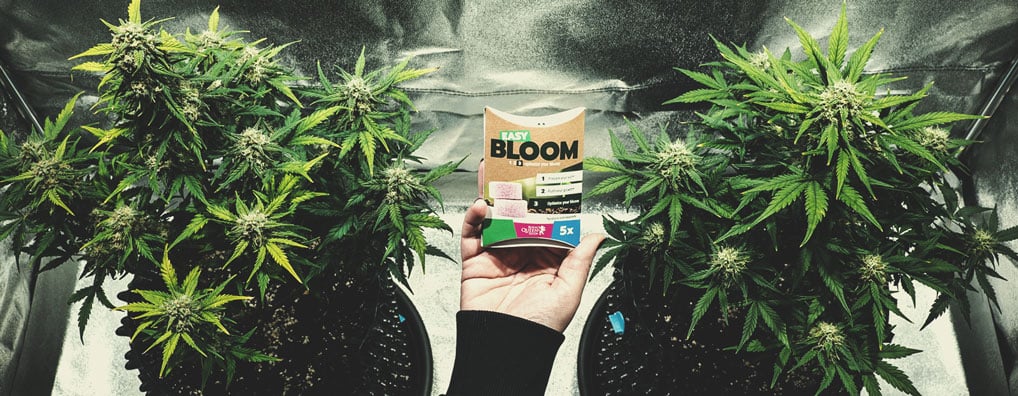
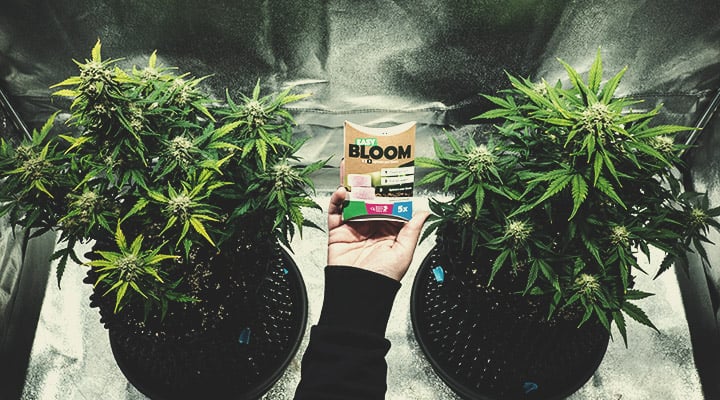
Macronutrients
If you look at the label wrapped around any bloom booster bottle, you’ll see certain salts that provide phosphorus and potassium. These larger compounds feature macronutrients in bound-up forms, but they break away into smaller, plant-available cations when dissolved into water. Let’s get to know these two players a little better:
- Phosphorous: Where to start with phosphorus? This element makes plants what they are in a very physical way. It forms an important component of nucleic acid structure—chemical compounds that serve as the information-carrying molecules in cells. It also plays a role in enzyme activity resulting in the production of adenosine triphosphate (ATP), the cellular unit of energy. Nucleic acids play a key role in protein synthesis, cell division, and the development of new tissues. In the flowering phase, phosphorus helps cannabis plants form new roots, flowers, and seeds. Plants deficient in this macronutrient display stunted growth and abnormally dark-green leaves.
- Potassium: This element facilitates lots of critical microscopic movements within cannabis plants; potassium contributes to the movement of water, carbohydrates, and nutrients in plant tissues. . Potassium helps to oversee the opening and closing of small holes in leaf surfaces known as stomata, which play an important role in gas exchange. Of massive importance in the flowering stage, potassium facilitates strong stems; cannabis plants pack on some serious size as they stretch during flowering.
Secondary Macronutrients
Aside from these three primary macronutrients, cannabis also requires calcium, magnesium, and sulphur as secondary macronutrients. They aren’t required in the same quantities as NPK, but plants use higher volumes of secondary macronutrients than trace micronutrients.
Fortunately, many bloom booster products also contain secondary macronutrients. You’ll often find calcium and magnesium in the forms of calcium bicarbonate and magnesium sulphate. As well as helping flowering cannabis plants fulfil important biological processes, these nutrients are added to bloom boosters to prevent nutrient antagonism—when the high concentration of one nutrient inhibits the uptake of another.
Potassium, calcium, and magnesium share similar chemical properties, and plants take them up in a similar manner. This mechanism means growers can run into deficiency troubles if they’re not careful. Adding high levels of potassium during the flowering stage without additional magnesium and calcium makes micronutrients susceptible to nutrient antagonism. Adding them in alongside blooming nutrients ensures the levels remain balanced and that this phenomenon doesn’t occur.
The Benefits of Weed Bloom Boosters
Bloom boosters offer notable benefits in certain contexts. Some of the best reasons to apply these fertilisers to your flowering cannabis plants include:
| Convenient | Bloom boosters offer an easy option when it comes to meeting nutrient requirements during the flowering stage. They are particularly useful for occasional growers that want a quick harvest without investing too much time learning about organic living soil techniques. |
| Accurate | With bloom boosters, growers can feed their crop accurate doses of flowering macronutrients. Each product, whether in tablet or liquid form, contains a set amount of salts that are easy to measure out. |
| Easy to use | These inorganic nutrients are simple and easy to apply. Mix them with water at the desired concentration, and provide a near-instant hit of goodness to your plants. |
| Organic options | Growers with a penchant for organic and regenerative techniques can also administer bloom boosters using organic sources. Aerated compost teas made using worm castings provide a heavy dose of beneficial microbes and a good serving of calcium, phosphorus, and potassium. KNF preparations such as water-soluble calcium phosphate also deliver this micronutrient rapidly when administered as a foliar spray. |
| Convenient |
| Bloom boosters offer an easy option when it comes to meeting nutrient requirements during the flowering stage. They are particularly useful for occasional growers that want a quick harvest without investing too much time learning about organic living soil techniques. |
| Accurate |
| With bloom boosters, growers can feed their crop accurate doses of flowering macronutrients. Each product, whether in tablet or liquid form, contains a set amount of salts that are easy to measure out. |
| Easy to use |
| These inorganic nutrients are simple and easy to apply. Mix them with water at the desired concentration, and provide a near-instant hit of goodness to your plants. |
| Organic options |
| Growers with a penchant for organic and regenerative techniques can also administer bloom boosters using organic sources. Aerated compost teas made using worm castings provide a heavy dose of beneficial microbes and a good serving of calcium, phosphorus, and potassium. KNF preparations such as water-soluble calcium phosphate also deliver this micronutrient rapidly when administered as a foliar spray. |
Downsides of Marijuana Bloom Boosters
However, bloom boosters can also cause some issues for growers, especially when applied incorrectly. Some of the biggest challenges they pose include:
| Easy to overfeed | It’s easy to overfeed with bloom boosters, and beginners are especially prone to administering too much, too frequently. |
| Nutrient lockout | Applying these products too heavily can lead to nutrient antagonism, nutrient lockout, and detrimental pH shifts. Thankfully, there are techniques to fix nutrient lockout before it gets too serious, such as flushing your soil with pH-balanced water and increasing the levels of micronutrients such as calcium and magnesium. |
| Tissue burn | Excess nutrients can burn roots and leaves, leading to unsightly plants that need time to recover, which can impact yield further down the line. |
| Microbial impact | There are two camps when it comes to the impact of inorganic fertilisers on the soil microbiome. Some suggest that chemical inputs are deadly to beneficial soil life and disrupt natural nutrient cycling, especially when used in too-high amounts. The other side claims that chemical fertilisers actually feed beneficial organisms and don’t cause them any harm when used in appropriate quantities. |
| Easy to overfeed |
| It’s easy to overfeed with bloom boosters, and beginners are especially prone to administering too much, too frequently. |
| Nutrient lockout |
| Applying these products too heavily can lead to nutrient antagonism, nutrient lockout, and detrimental pH shifts. Thankfully, there are techniques to fix nutrient lockout before it gets too serious, such as flushing your soil with pH-balanced water and increasing the levels of micronutrients such as calcium and magnesium. |
| Tissue burn |
| Excess nutrients can burn roots and leaves, leading to unsightly plants that need time to recover, which can impact yield further down the line. |
| Microbial impact |
| There are two camps when it comes to the impact of inorganic fertilisers on the soil microbiome. Some suggest that chemical inputs are deadly to beneficial soil life and disrupt natural nutrient cycling, especially when used in too-high amounts. The other side claims that chemical fertilisers actually feed beneficial organisms and don’t cause them any harm when used in appropriate quantities. |
-
When to Use Bloom Boosters
Bloom boosters are put to use after plants initiate flowering. Autoflowering varieties will make this shift based on their internal biological clock, whereas photoperiod strains rely on external light cues—either in the form of reduced sunlight hours or a switch to a 12/12 light cycle indoors.
Note that the first week or so of flowering is generally dedicated to a final burst of growth, known as the flowering stretch. For this reason, some wait to apply bloom boosters until they notice actual signs of flower formation. When you see flowers starting to form at the nodes (the points at which branches intersect with the main stem), you should switch your nutrient regimen to a flowering formula.


-
How to Use Bloom Boosters
The best way to apply inorganic bloom boosters? Follow the instructions on your product of choice. There is no one-size-fits-all approach. Different products contain varying formulas and strengths, and are best applied at slightly different times and in different ways depending on their composition. Fortunately, each product should provide clear guidelines on correct application.
Ultimately, you’ll use bloom boosters for one of two general purposes: to enhance the nutrient content of decent soil and prevent deficiencies, or to remediate depleted soils and fix deficiencies.
If you’re already starting out with relatively healthy soil, you can use bloom boosters preemptively to make sure your flowering plants receive all of the nutrients they need to form healthy and phytochemical-rich buds, and to prevent them from running into trouble further down the line.
However, if you’re starting with poor soil, bloom boosters work less as a preventative measure and more as a lifeline. In these circumstances, the plant becomes dependent on the grower for sufficient flowering nutrients due to the lack of microbes and nutrient cycling in the soil. You can still achieve great yields this way, as many cultivators do year after year.
Finally, bloom boosters can be used in cases of nutrient deficiencies. Even if you think you have high-quality living soils, pH issues and nutrient antagonism can lead to plants exhibiting symptoms. After correcting the "root" cause, a dose of bloom booster can help to restore balance and ensure plants recover swiftly.
RQS Bloom Boosters
At RQS, we harnessed decades of cultivation experience to create our Bio Flowering Booster Pack. Each pack contains three 75ml bottled formulas that are entirely vegan. Below, you’ll find out how and when to administer each one.
- Thicker Flowers: As the name suggests, Thicker Flowers contains ideal amounts of phosphorus and potassium to drive flower production and size. Start applying by the second week of flowering, administering 0.4ml per litre with each watering. Increase the dose to 0.6ml per litre by week three, then to 0.8ml during week four, and 1ml per litre during weeks five and six. By the end of the flowering stage, apply 1.2ml per litre during week seven, and then gradually reduce to under 1ml by week eight. If you use Thicker Flowers alongside products such as RQS Bat Guano and Easy Bloom, look out for signs of nutrient toxicity.
- Bigger Flowers: This bottle contains everything you need for sizeable buds. A mix of enzymes, vitamins, and growth stimulants ensure big and dense colas. You can apply this formula throughout the entire growing cycle to reap maximum benefits. During the vegetative phase, use 0.5ml per litre every day, or 1ml every other day up until the second week of flowering. Apply 0.8ml per litre during the third week of bloom, and 1ml per litre for the remainder of the flowering stage until flushing. Bigger Flowers is compatible with all other RQS products.
- Sweeter Flowers: This bottle harnesses an array of amino acids and potassium to switch terpene production into overdrive. Compatible with all RQS fertiliser products, you only need to apply this product during the final four weeks of flowering to boost the aroma of your buds. Administer 0.4ml per litre of water during week five of flowering, 0.7ml during week six, 0.8ml during week seven, and 1ml during week eight.
Cannabis Bloom Boosters: A Nuanced Input
As you’ve learned, there’s a lot to consider when feeding a cannabis plant. Bloom boosters certainly aren’t an essential input every cannabis grower must apply; experienced growers that have spent several seasons building healthy living soils often avoid them. However, boosters offer beginners and casual growers a reliable way to ensure plants receive everything they need to deliver a satisfying yield.


























